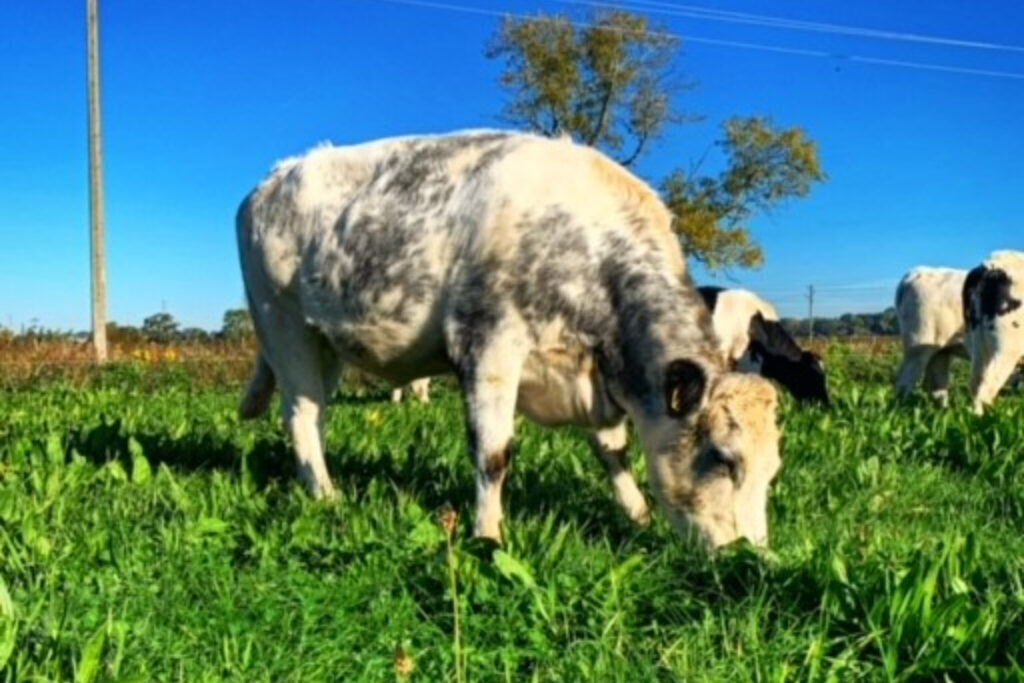That’s Farming editor, Catherina Cunnane, in conversation with James Herrick (31) of Folly Farm in Leicestershire, England, in part two of his interview in this week’s Suckler Focus segment. You can read part one of his interview via this link.
“Most mornings start with me feeding and bedding finished cattle, whilst dad is busy moving suckler mobs on rotation.
After breakfast, we will then set out on whatever the day’s jobs are, whether it is silaging, spraying, combining or cattle work.
Our system is designed to be simple and look after itself. I want everything to be as hands-off as possible, wherever it can be.
I think one of the biggest challenges I have had to overcome has been to stop thinking that the way we have always done a job is the best way to do it.
We need to question everything we do to make the most of our time and effort.
For example, I hate dehorning calves, but we now have the ability to use homozygous polled bulls with excellent EBVS eliminating the need to do it, saving time and distress and making things easier all around.
The rise in input costs has made us seriously think about our business and the way we operate.
The unpredictability of commodity prices means we have to make our business as resilient as possible, especially with the future of farm support still so uncertain in the UK.
For me, the way to address these challenges is to constantly review the systems we have in place, amend them, simplify them and maximise our output per labour unit.
It is easy to spread yourself too thinly, trying to do every job under the sun but not doing anything well.
Future
Short-term, we are aiming to drive cattle numbers up to 200 sucklers on a grass-based system.
We are introducing the concept of using multiple bulls in large groups of cows to further reduce calving interval and reduce the number of cattle groups on-farm; for example, groups of 60 to 90 cows with 2 or 3 bulls in the group.
This will eliminate the need to rotate bulls between groups, saving us one day every three weeks during the breeding season and also provides peace of mind should a bull go lame or get injured.

Future plans
Long term, I aim to continue to drive numbers and hopefully introduce selling breeding stock to other farmers looking to run similar systems.
I would also like to working collaboration with local arable farmers to increase the ability for us to out winter stock through growing brassicas as part of their rotations or to grow grasses and herbal leys to help improve the soils on their farms and give them access to a different break crop.
Moreover, I would like to improve the number of cows managed per person.
I think with the right cows, time management and production system, there is no reason why we could not get to a point where one person could comfortably look after 400 sucklers for most of the year.
Suckler farming
I believe the future of suckler farming is bright, but I also think for it to be that way, a lot of farmers need to review the way they produce stock.
In my opinion, the days of large cows (800kg plus) and bulls that produce progeny that need veterinary assistance to calve are behind us.
The future lies in cows that calve themselves, flesh easily, thrive off grass and do not need to be mollycoddled.
Those calves may not be E grades at slaughter; however, you will be able to produce significantly more numbers with a lot less intervention, more than making up the shortfall difference, and still get a full night’s sleep.
Advice
If I could give young or aspiring farmers any advice, it would be to get yourself out there.
No matter where in the industry you want to end up, be willing to milk cows, go fencing, lamb at night etc., to get your foot in the door.
You will learn so much, and in this industry, you can never know or experience enough.
I would also say, do not be afraid to ask questions. You may find a gem of information that will change the way you farm forever.
Reflection
I have always wanted to be a farmer, and having the ability to do the job you have always wanted to do is something that very few of us are lucky enough to ever experience.
It has been a long road to get me to where I am today, but for the first time ever, it feels like I am right where I should be.”
To share your story, email – [email protected]





